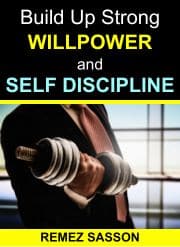
Self-improvement isn’t all that it’s cracked up to be.
While there is something empowering about trying to be better and more successful, there’s an unfortunate downside to constantly trying to improve yourself.
I learned this the hard way.
Browse our online courses on meditation, positive thinking, overcoming procrastination, and freedom from distractions.
For most of my adult life, I was addicted to self-improvement. It certainly drove me to great heights, having created an idea sharing platform with millions of monthly visitors.
But ultimately the pursuit of self-improvement resulted in me feeling lost and without purpose. I believe it may be doing the same with you.
In this article, I’ll give you three reasons why too much self-improvement is a bad thing, and what you can do instead.
Why too much Self-Improvement Can Be Bad for You
1. There’s too much emphasis on “positive thinking”
If I had a dollar for every time I heard someone say to “be positive”, I’d be a millionaire.
Yet there’s a sinister dark side to positive thinking. The shaman Rud? Iand? explains that even the most challenging emotions have an important function. But when you deny feeling them, they just become stronger at a subconscious level.
The self-improvement industry urges you to “be positive”. But doing so denies a key part of who you are.
As Ruda Iande says: “When you embrace the full spectrum of who you are – including the sadness, anger, insecurity and fear – all the energy you used to fight against yourself becomes available for living and creating.”
2. Self improvement glorifies the outcome and ignores the process
The blaring message of self development is this: You can achieve anything you set your mind to.
It works… up to a point. Because there’s only so much that “visualization” can do.
First of all, it separates the goal from what you need to do to get it. And second, it enables you to enjoy the feeling of being successful without actually having achieved anything. That takes away the power of the goal-and can even make you complacent, unwilling to work hard or take risks to get you what you already have in your daydreams.
You need to work hard to better yourself, too. It’s a grueling process. You need to challenge yourself mentally, emotionally, and physically. You don’t just “imagine” your dream life. You make it into a reality.
3. It makes you feel dissatisfied with yourself
“Self-improvement” makes you believe that you aren’t enough.
I’ve fallen victim to this mentality. I felt as if I needed to achieve more. I needed to earn more money, to work more hours, to have more things-to the point that I never even noticed what I had. I never enjoyed my successes. I was too busy moving on to the next “better” thing.
Isn’t the point of self-improvement to achieve a state of accomplishment? This is where it all becomes self-defeating. By trying to improve ourselves so much, we end up loving ourselves less.
Make self-improvement work for you (not against you)
How do we approach self improvement in a healthy, sustainable way? I have three suggestions.
1. Accept whatever version of yourself you are at the moment
Instead of thinking: “how can I be more?,” think: “how can I be the best version of myself?”
Let go of the notion that there’s something you need to “fix” about yourself. There’s nothing inherently wrong about you.
It’s important to find balance in all areas of our lives. That’s especially the case when it comes to personal development and growth. There needs to be a balance between trying to be a better version of yourself, and accepting who you are at the present moment.
We’re constantly evolving. We make mistakes; we learn. We grow. It’s a cycle we need to embrace. We don’t need to try to achieve a state of perfection. We just need to try to be better than we were yesterday and love who we are today.
2. Keep reevaluating your goals
Things change. You change. What might be a priority to you right now might not seem all that important tomorrow. The only way for self improvement to work for you is if you keep reevaluating your priorities.
Revisit yourself from time and time and weigh in what matters. This way, you won’t get stuck trying to achieve one goal, end up achieving it, and feeling comically empty afterwards.
Think of this process as a simple “readjustment,” a way for you to ensure your vision is aligned to your authentic being.
3. Cultivate self-awareness
Self improvement is impossible without self-awareness.
Self-awareness is all about being honest with yourself. It’s having a deep understanding of who you are, what you need, and where you want to go.
I’m not saying that knowing yourself is a fix-all to all your problems. But it’s step one. When we’re truly honest with where we are at – needs, desires, strengths and limitations included – we are better equipped to make changes that are true to our authentic selves.
Truly being self-aware allows us to have better control over our decision-making and ultimately, our emotional response to life. It’s the only way we can “improve” ourselves while not breaking ourselves in the process.
Author Bio
Justin Brown is the CEO of Ideapod, a successful personal development platform with online workshops on authenticity and creativity. Ideapod has millions of monthly readers and multiple products helping people to think critically, see issues clearly and engage with the world responsibly. Link: ideapod.com/


